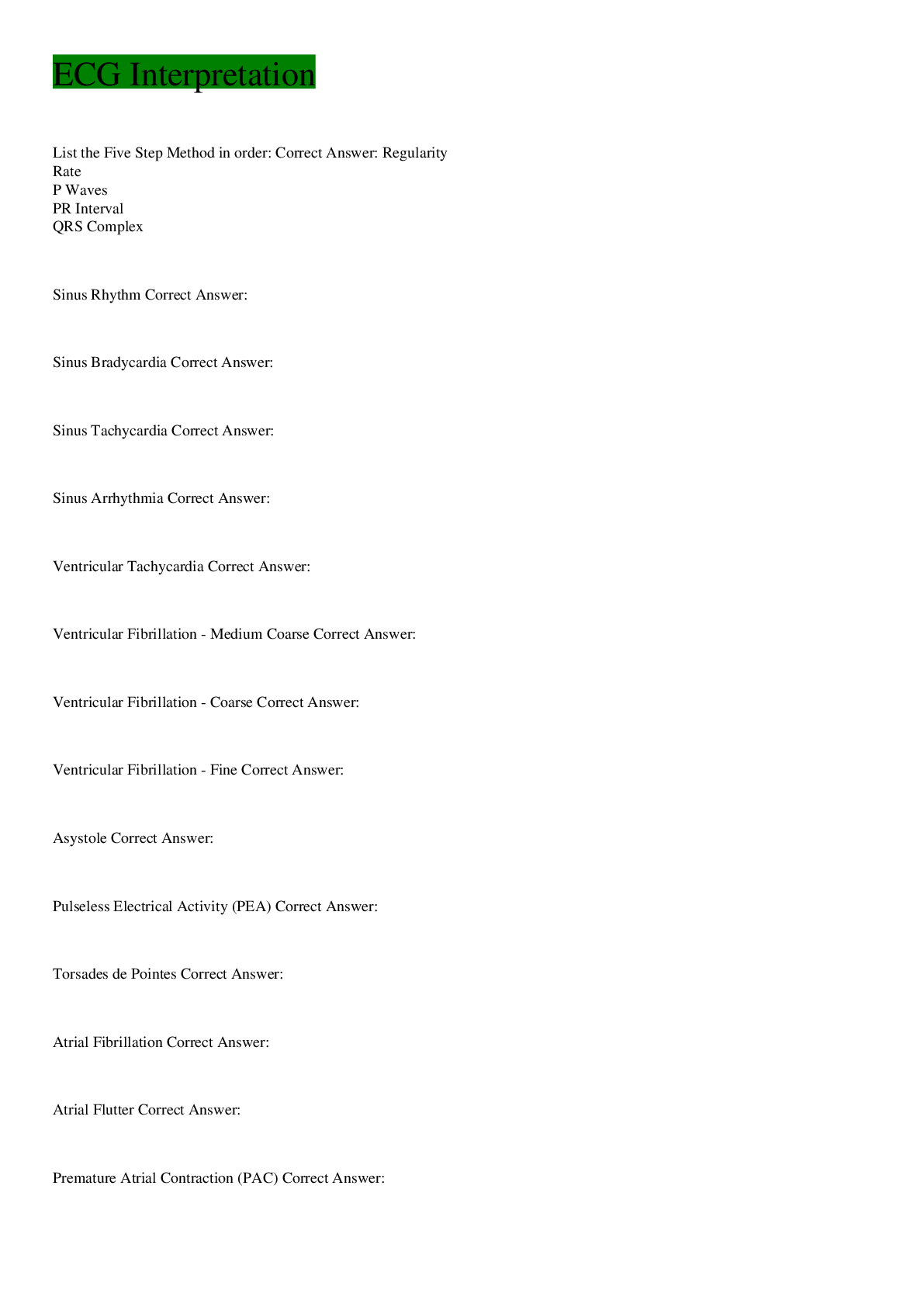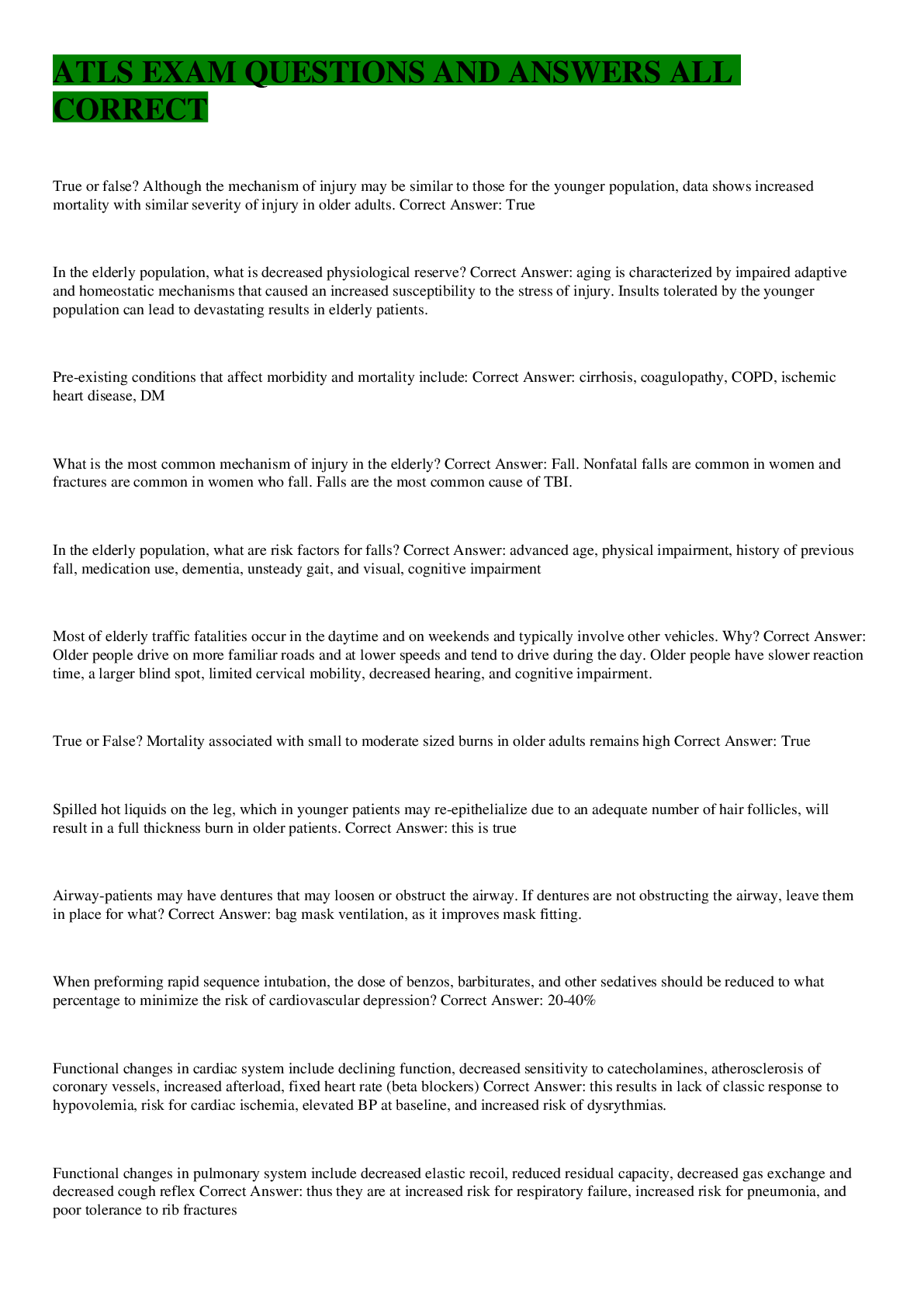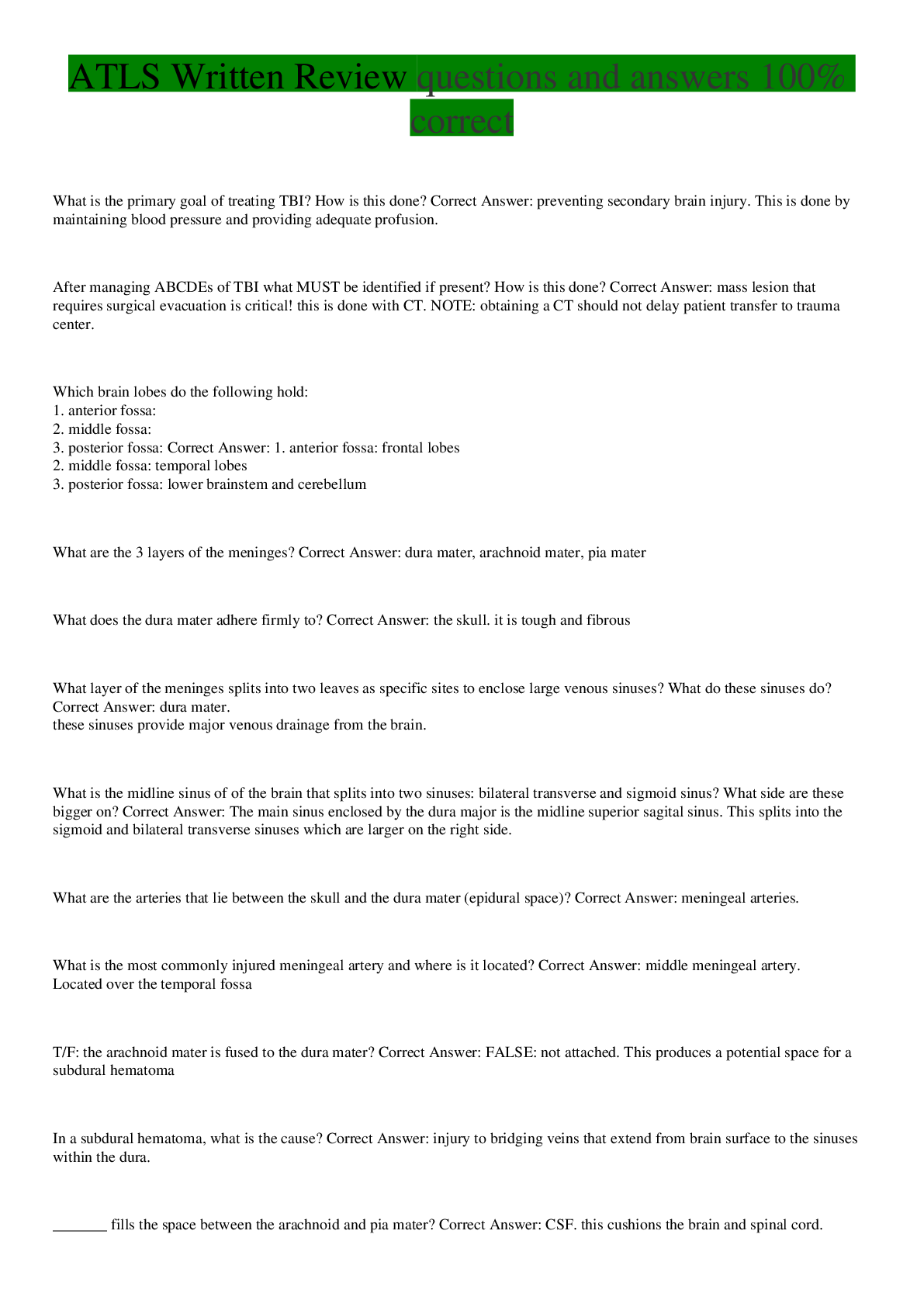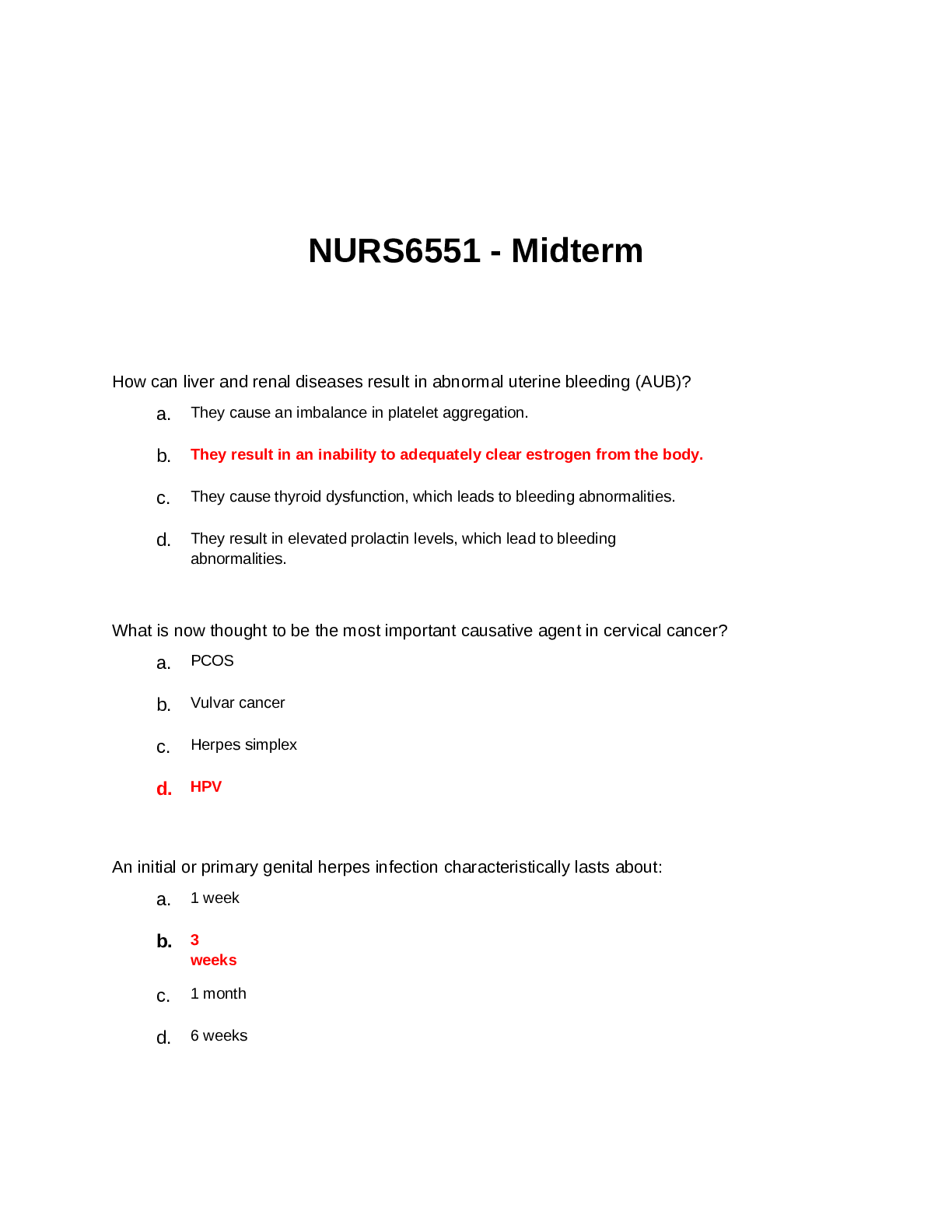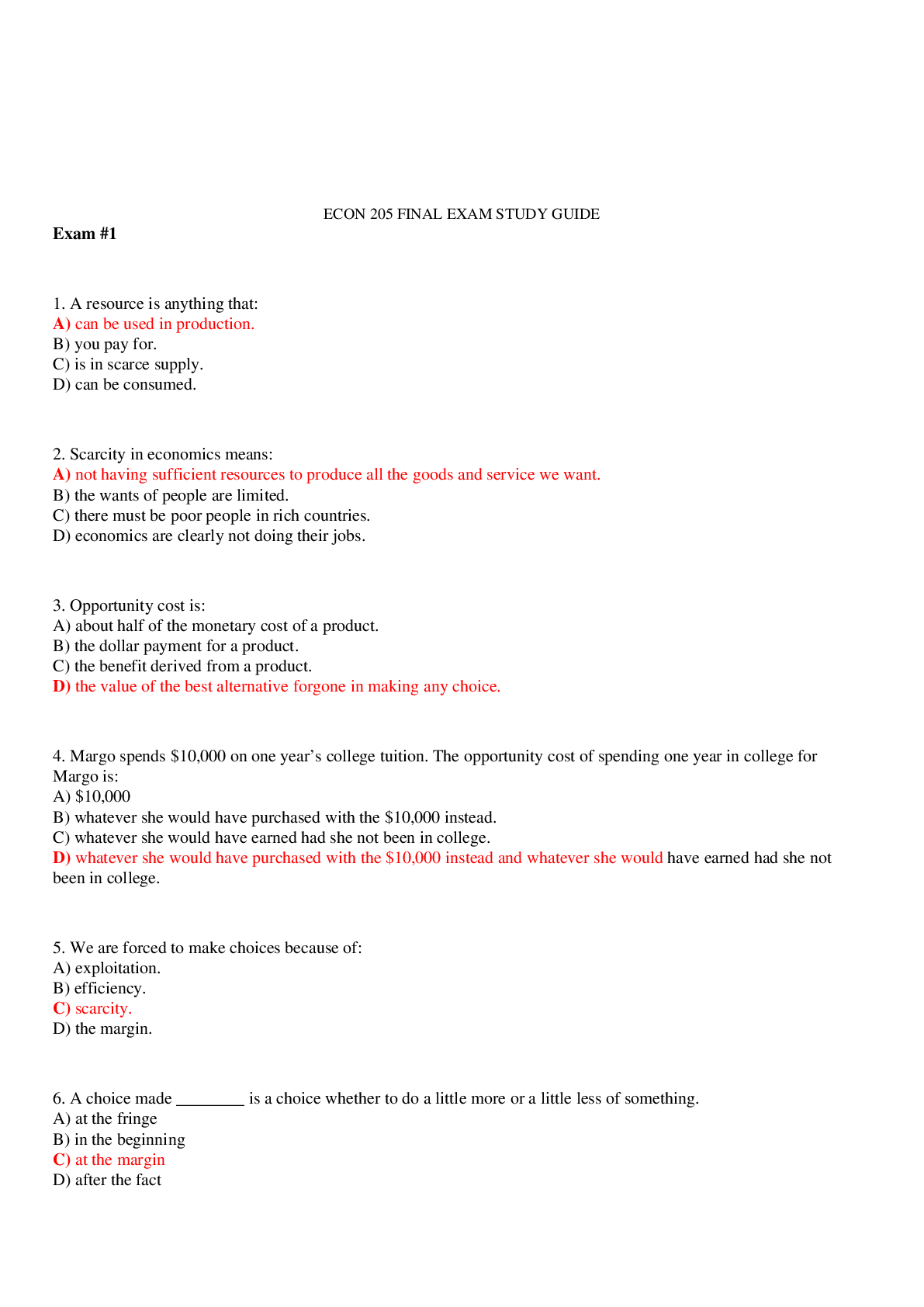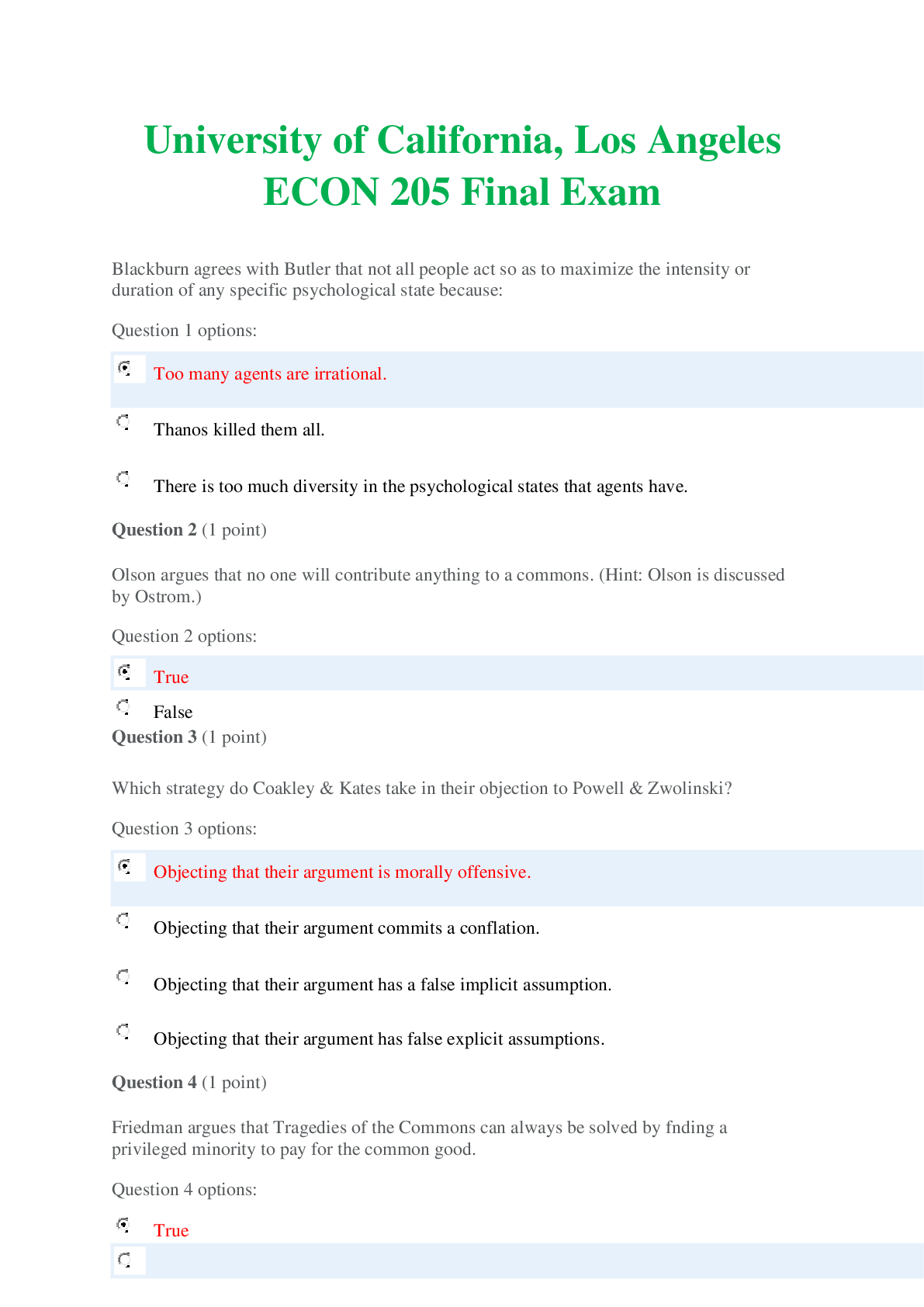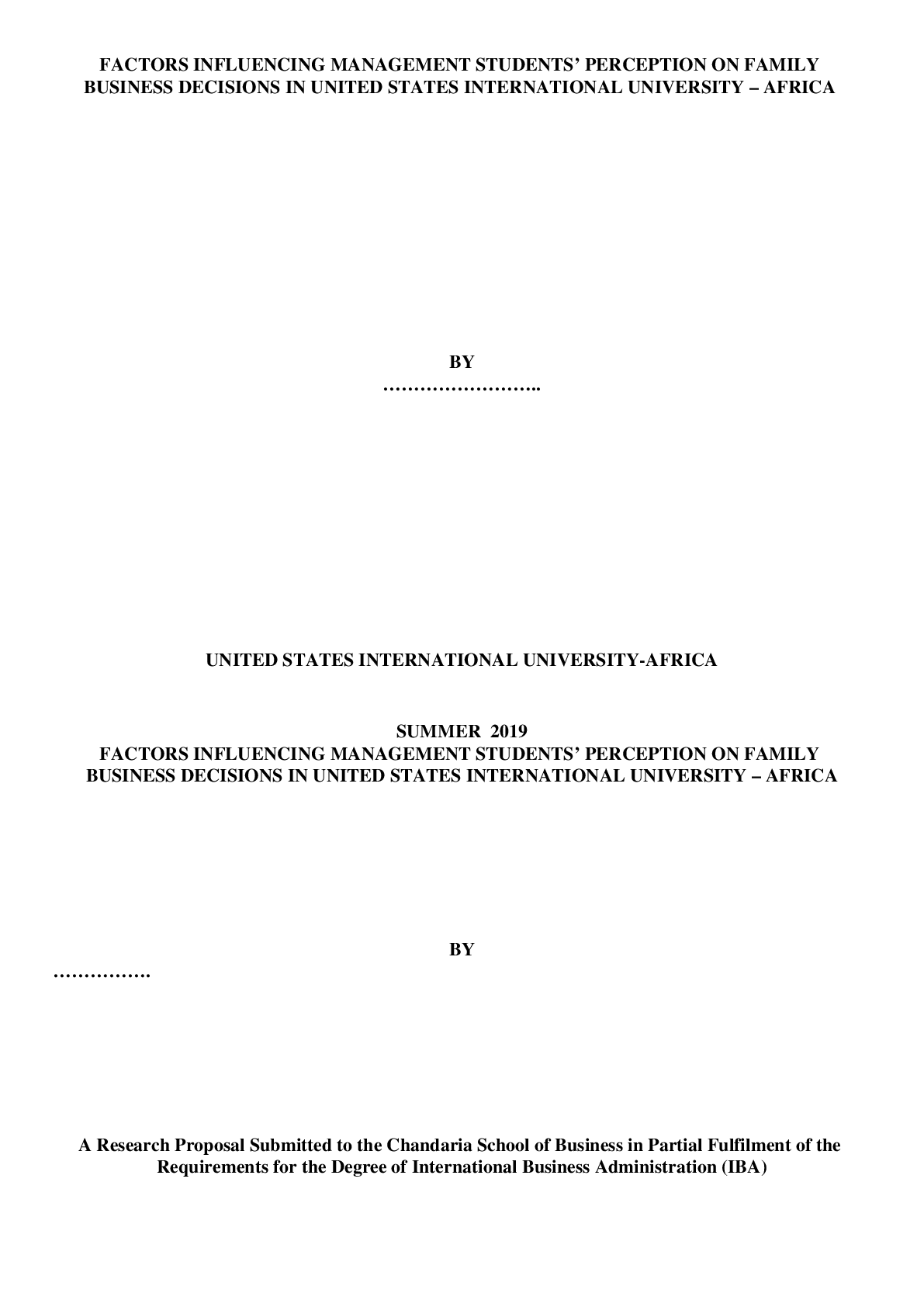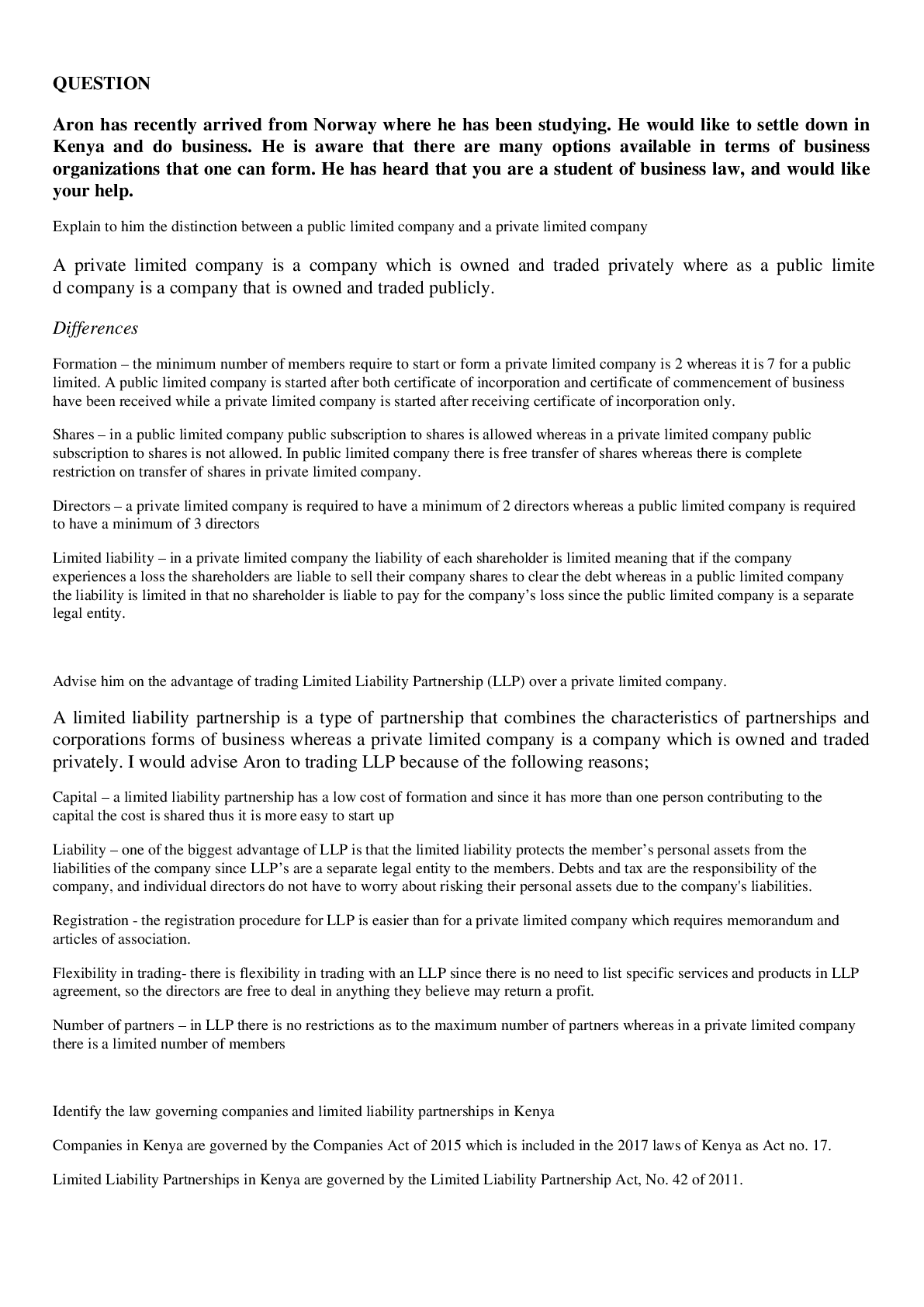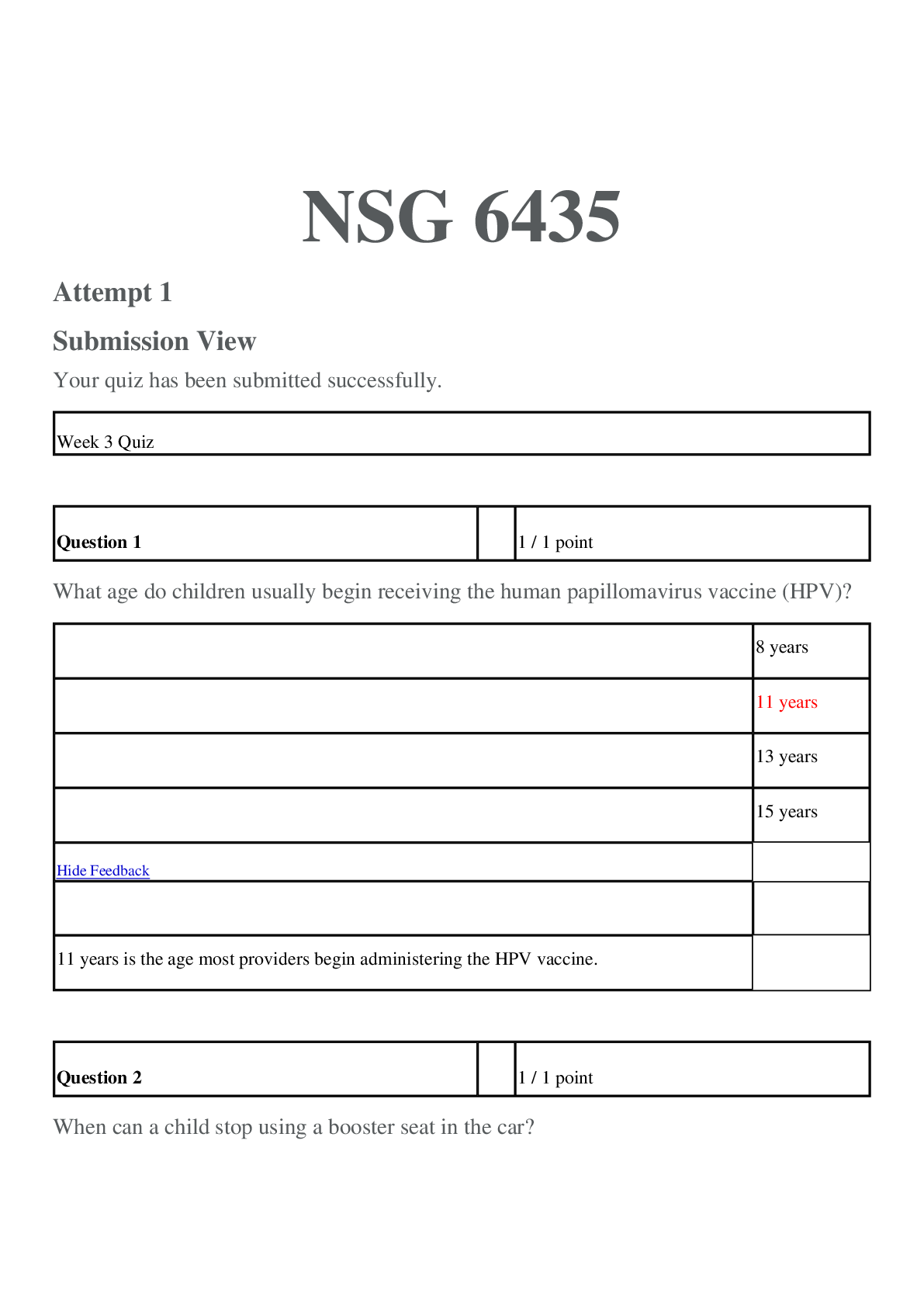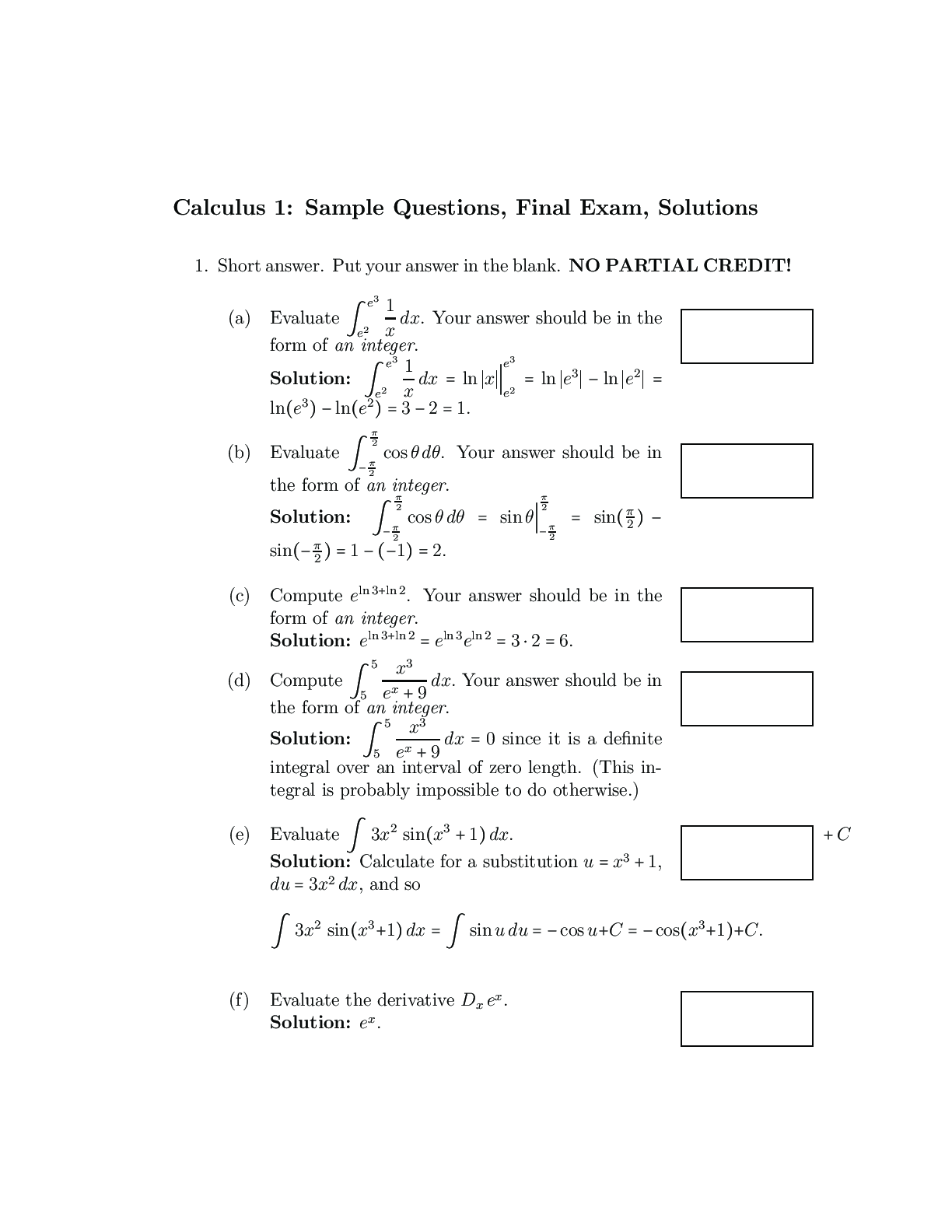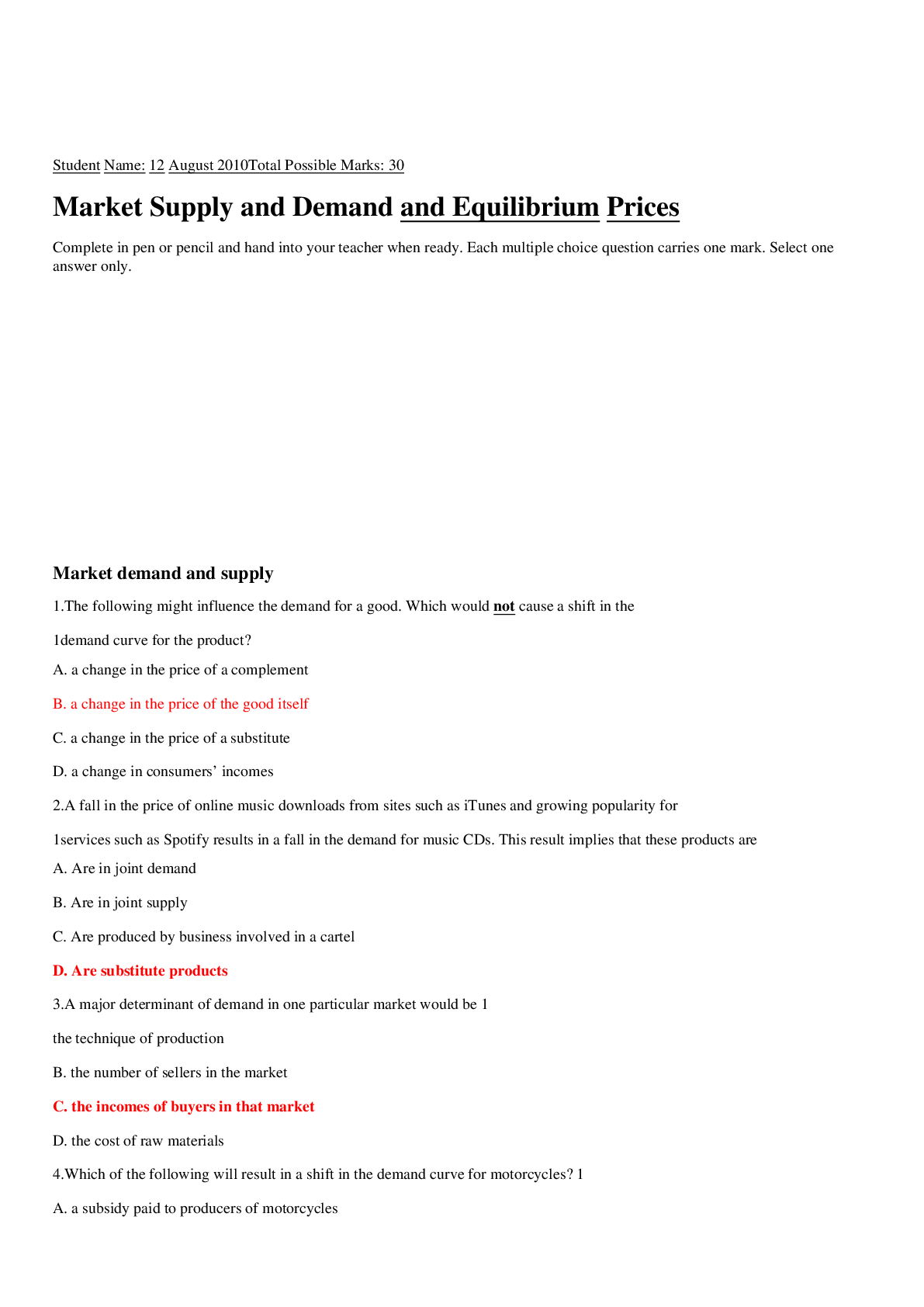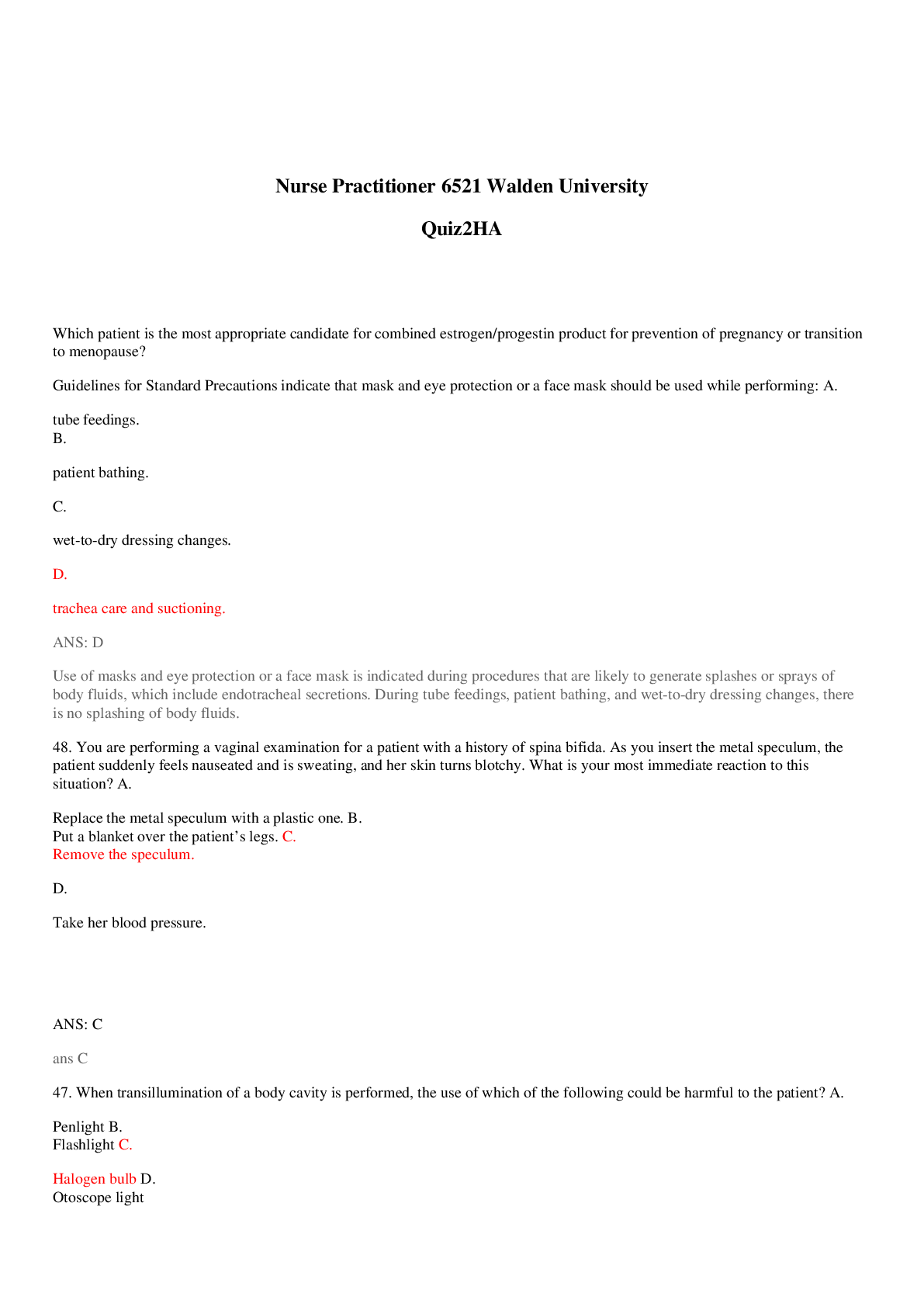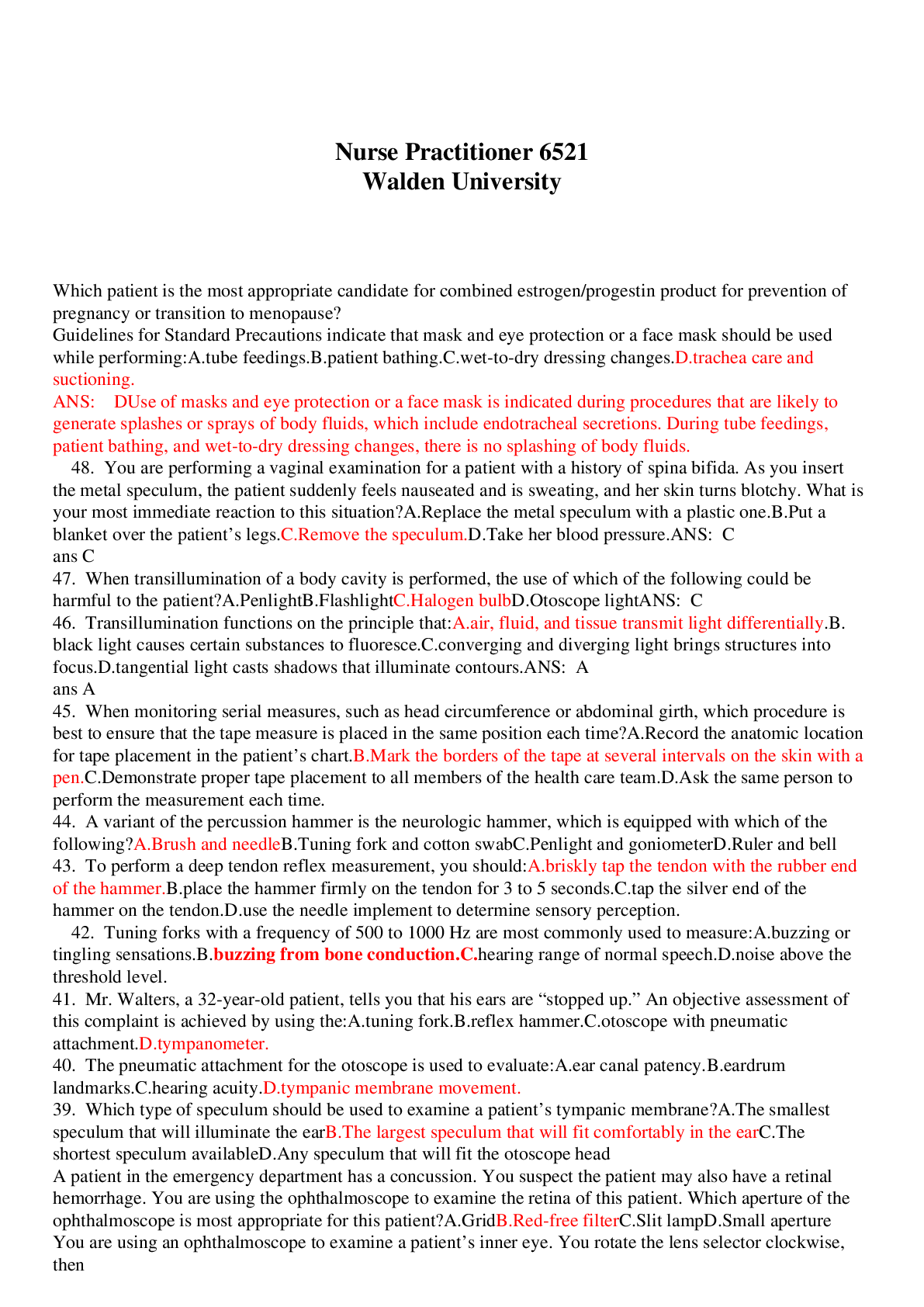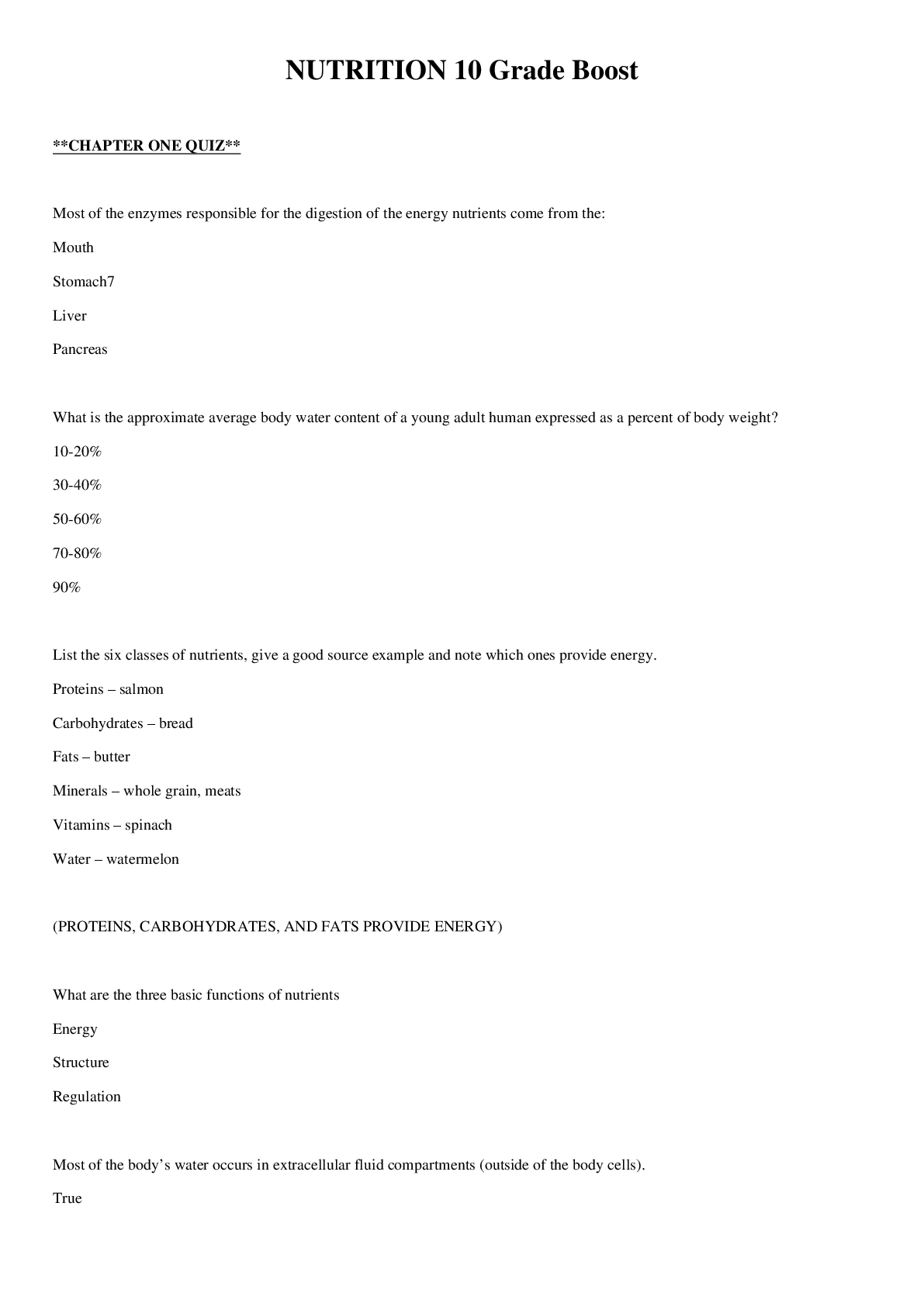Health Care > EXAM > HESI Comprehensive Exit Exam (All)
HESI Comprehensive Exit Exam
Document Content and Description Below
HESI Comprehensive Exit Exam 1-Enalapril maleate (Vasotec) is prescribed for a hospitalized client. Which assessment does the nurse perform as a priority before administering the medication? A. ... Checking the client's blood pressure B. Checking the client's peripheral pulses C. Checking the most recent potassium level D. Checking the client's intake-and-output record for the last 24 hours Correct Answer: A. Checking the client's blood pressure Checking the client's blood pressure Enalapril maleate is an angiotensin-converting enzyme (ACE) inhibitor used to treat hypertension. One common side effect is postural hypotension. Therefore the nurse would check the client's blood pressure immediately before administering each dose. Checking the client's peripheral pulses, the results of the most recent potassium level, and the intake and output for the previous 24 hours are not specifically associated with this mediation. 2-A client is scheduled to undergo an upper gastrointestinal (GI) series, and the nurse provides instructions to the client about the test. Which statement by the client indicates a need for further instruction? A. "The test will take about 30 minutes." B. "I need to fast for 8 hours before the test." C. "I need to drink citrate of magnesia the night before the test and give myself a Fleet enema on the morning of the test." D. "I need to take a laxative after the test is completed, because the liquid that I'll have to drink for the test can be constipating." Correct Answer: C. "I need to drink citrate of magnesia the night before the test and give myself a Fleet enema on the morning of the test." An upper GI series involves visualization of the esophagus, duodenum, and upper jejunum by means of the use of a contrast medium. It involves swallowing a contrast medium (usually barium), which is administered in a flavored milkshake. Films are taken at intervals during the test, which takes about 30 minutes. No special preparation is necessary before a GI series, except that NPO status must be maintained for 8 hours before the test. After an upper GI series, the client is prescribed a laxative to hasten elimination of the barium. Barium that remains in the colon may become hard and difficult to expel, leading to fecal impaction. 3-A nurse on the evening shift checks a physician's prescriptions and notes that the dose of a prescribed medication is higher than the normal dose. The nurse calls the physician's answering service and is told that the physician is off for the night and will be available in the morning. The nurse should: A. Call the nursing supervisor B. Ask the answering service to contact the on-call physician C. Withhold the medication until the physician can be reached in the morning D. Administer the medication but consult the physician when he becomes available Correct Answer: B. Ask the answering service to contact the on-call physician 4.An emergency department (ED) nurse is monitoring a client with suspected acute myocardial infarction (MI) who is awaiting transfer to the coronary intensive care unit. The nurse notes the sudden onset of premature ventricular contractions (PVCs) on the monitor, checks the client's carotid pulse, and determines that the PVCs are not resulting in perfusion. The appropriate action by the nurse is: A. Documenting the findings B. Asking the ED physician to check the client C. Continuing to monitor the client's cardiac status D. Informing the client that PVCs are expected after an MI Correct Answer: B. Asking the ED physician to check the client 5.NPO status is imposed 8 hours before the procedure on a client scheduled to undergo electroconvulsive therapy (ECT) at 1 p.m. On the morning of the procedure, the nurse checks the client's record and notes that the client routinely takes an oral antihypertensive medication each morning. The nurse should: A. Administer the antihypertensive with a small sip of water B. Withhold the antihypertensive and administer it at bedtime C. Administer the medication by way of the intravenous (IV) route D. Hold the antihypertensive and resume its administration on the day after the ECT Correct Answer: A. Administer the antihypertensive with a small sip of water 6 A client who recently underwent coronary artery bypass graft surgery comes to the physician's office for a follow-up visit. On assessment, the client tells the nurse that he is feeling depressed. Which response by the nurse is therapeutic? A. "Tell me more about what you're feeling." B. "That's a normal response after this type of surgery." C. "It will take time, but, I promise you, you will get over this depression." D. "Every client who has this surgery feels the same way for about a month." Correct Answer: A. "Tell me more about what you're feeling." 7 A client in labor experiences spontaneous rupture of the membranes. The nurse immediately counts the fetal heart rate (FHR) for 1 full minute and then checks the amniotic fluid. The nurse notes that the fluid is yellow and has a strong odor. Which of the following actions should be the nurse's priority? A. Contacting the physician B. Documenting the findings C. Checking the fluid for protein D. Continuing to monitor the client and the FHR Correct Answer: A. Contacting the physician Correct 8 A nurse has assisted a physician in inserting a central venous access device into a client with a diagnosis of severe malnutrition who will be receiving parenteral nutrition (PN). After insertion of the catheter, the nurse immediately plans to: A. Call the radiography department to obtain a chest x-ray B. Check the client's blood glucose level to serve as a baseline measurement C. Hang the prescribed bag of PN and start the infusion at the prescribed rate D. Infuse normal saline solution through the catheter at a rate of 100 mL/hr to maintain patency Correct Answer: A. Call the radiography department to obtain a chest x-ray 9 A rape victim being treated in the emergency department says to the nurse, "I'm really worried that I've got HIV now." What is the appropriate response by the nurse? A. "HIV is rarely an issue in rape victims." B. "Every rape victim is concerned about HIV." C. "You're more likely to get pregnant than to contract HIV." D. "Let's talk about the information that you need to determine your risk of contracting HIV." Correct Answer: D. "Let's talk about the information that you need to determine your risk of contracting HIV." 10 A client is taking prescribed ibuprofen (Motrin), 300 mg orally four times daily, to relieve joint pain resulting from rheumatoid arthritis. The client tells the nurse that the medication is causing nausea and indigestion. The nurse should tell the client to: A. Contact the physician B. Stop taking the medication C. Take the medication with food D. Take the medication twice a day instead of four times Correct Answer: C. Take the medication with food 11 A client's oral intake of liquids includes 120 mL on the night shift, 800 mL on the day shift, and 650 mL on the evening shift. The client is receiving an intravenous (IV) antibiotic every 12 hours, diluted in 50 mL of normal saline solution. The nurse empties 700 mL of urine from the client's Foley catheter at the end of the day shift. Thereafter, 500 mL of urine is emptied at the end of the evening shift and 325 mL at the end of the night shift. Nasogastric tube drainage totals 155 mL for the 24-hour period, and the total drainage from the Jackson-Pratt device is 175 mL. What is the client's total intake during the 24-hour period? Type your answer in the space provided. Answer: ________mL Correct Answer: Correct Responses: "1670" 12 Lorazepam (Ativan) 1 mg by way of intravenous (IV) injection (IV push) is prescribed for a client for the management of anxiety. The nurse prepares the medication as prescribed and administers the medication over a period of: A. 3 minutes B. 10 seconds C. 15 seconds D. 30 minutes Correct Answer: A. 3 minutes Correct 13 A nurse, conducting an assessment of a client being seen in the clinic for symptoms of a sinus infection, asks the client about medications that he is taking. The client tells the nurse that he is taking nefazodone hydrochloride (Serzone). On the basis of this information, the nurse determines that the client most likely has a history of: A. Depression B. Diabetes mellitus C. Hyperthyroidism D. Coronary artery disease Correct Answer: A. Depression 14 Phenelzine sulfate (Nardil) is prescribed for a client with depression. The nurse provides information to the client about the adverse effects of the medication and tells the client to contact the physician immediately if she experiences: A. Dry mouth B. Restlessness C. Feelings of depression D. Neck stiffness or soreness Correct Answer: D. Neck stiffness or soreness Correct 15 Risperidone (Risperdal) is prescribed for a client hospitalized in the mental health unit for the treatment of a psychotic disorder. Which finding in the client's medical record would prompt the nurse to contact the prescribing physician before administering the medication? A. The client has a history of cataracts. B. The client has a history of hypothyroidism. C. The client takes a prescribed antihypertensive. D. The client is allergic to acetylsalicylic acid (aspirin). Correct Answer: C. The client takes a prescribed antihypertensive. 16 A client who has been undergoing long-term therapy with an antipsychotic medication is admitted to the inpatient mental health unit. Which of the following findings does the nurse, knowing that long-term use of an antipsychotic medication can cause tardive dyskinesia, monitor in the client? A. Fever B. Diarrhea C. Hypertension D. Tongue protrusion Correct Answer: D. Tongue protrusion 17 A nurse is reviewing the record of a client scheduled for electroconvulsive therapy (ECT). Which of the following diagnoses, if noted on the client's record, would indicate a need to contact the physician who is scheduled to perform the ECT? A. Recent stroke B. Hypothyroidism C. History of glaucoma D. Peripheral vascular disease Correct Answer: A. Recent stroke 18 A client scheduled for suprapubic prostatectomy has listened to the surgeon's explanation of the surgery. The client later asks the nurse to explain again how the prostate is going to be removed. The nurse tells the client that the prostate will be removed through: A. A lower abdominal incision B. An upper abdominal incision C. An incision made in the perineal area D. The urethra, with the use of a cutting wire Correct Answer: A. A lower abdominal incision 19 A nurse is preparing a poster for a health fair booth promoting primary prevention of skin cancer. Which of the following recommendations does the nurse include on the poster? Select all that apply. A. Seek medical advice if you find a skin lesion. B. Use sunscreen with a low sun protection factor (SPF). C. Avoid sun exposure before 10 a.m. and after 4 p.m. D. Wear a hat, opaque clothing, and sunglasses when out in the sun. E. Examine the body every 6 months for possibly cancerous or precancerous lesions. Correct Answer: A. Seek medical advice if you find a skin lesion. D. Wear a hat, opaque clothing, and sunglasses when out in the sun. 20 A nurse reviewing the medical record of a client with a diagnosis of infiltrating ductal carcinoma of the breast notes documentation of the presence of peau d'orange skin. On the basis of this notation, which finding would the nurse expect to note on assessment of the client's breast? SEE PICS A. B. C. D. Correct Answer: B. Correct 21 The mother of an adolescent with type 1 diabetes mellitus tells the nurse that her child is a member of the school soccer team and expresses concern about her child's participation in sports. The nurse, after providing information to the mother about diet, exercise, insulin, and blood glucose control, tells the mother: A. To always administer less insulin on the days of soccer games B. That it is best not to encourage the child to participate in sports activities C. That the child should eat a carbohydrate snack about a half-hour before each soccer game D. To administer additional insulin before a soccer game if the blood glucose level is 240 mg/dL or higher and ketones are present Correct Answer: C. That the child should eat a carbohydrate snack about a half-hour before each soccer game 22 A client with chronic renal failure who will require dialysis three times a week for the rest of his life says to the nurse, "Why should I even bother to watch what I eat and drink? It doesn't really matter what I do if I'm never going to get better!" On the basis of the client's statement, the nurse determines that the client is experiencing which problem? A. Anxiety B. Powerlessness C. Ineffective coping D. Disturbed body image Correct Answer: B. Powerlessness 23 A nurse is providing morning care to a client in end-stage renal failure. The client is reluctant to talk and shows little interest in participating in hygiene care. Which statement by the nurse would be therapeutic? A. "What are your feelings right now?" B. "Why don't you feel like washing up?" C. "You aren't talking today. Cat got your tongue?" D. "You need to get yourself cleaned up. You have company coming today." Correct Answer: A. "What are your feelings right now?" 24 Empyema develops in a client with an infected pleural effusion, and the nurse prepares the client for thoracentesis. What characteristics of the fluid removed during thoracentesis should the nurse, assisting the physician with the procedure, expect to note? A. Clear and yellow B. Thick and opaque C. White and odorless D. Clear, with a foul odor Correct Answer: B. Thick and opaque 25 An emergency department nurse is told that a client with carbon monoxide poisoning resulting from a suicide attempt is being brought to the hospital by emergency medical services. Which intervention will the nurse carry out as a priority upon arrival of the client? A. Administering 100% oxygen B. Having a crisis counselor available C. Instituting suicide precautions for the client D. Obtaining blood for determination of the client's carboxyhemoglobin level Correct Answer: A. Administering 100% oxygen 26 A nurse is caring for a client with sarcoidosis. The client is upset because he has missed work and worried about how he will care financially for his wife and three small children. On the basis of the client's concern, which problem does the nurse identify? A. Anxiety B. Powerlessness C. Disruption of thought processes D. Inability to maintain health Correct Answer: A. Anxiety 27 A nurse, performing an assessment of a client who has been admitted to the hospital with suspected silicosis, is gathering both subjective and objective data. Which question by the nurse would elicit data specific to the cause of this disorder? A. "Do you chew tobacco?" B. "Do you smoke cigarettes?" C. "Have you ever worked in a mine?" D. "Are you frequently exposed to paint products?" Correct Answer: C. "Have you ever worked in a mine?" 28 A physician prescribes a dose of morphine sulfate 2.5 mg stat to be administered intravenously to a client in pain. The nurse preparing the medication notes that the label on the vial of morphine sulfate solution for injection reads "4 mg/mL." How many milliliters (mL) must the nurse draw into a syringe for administration to the client? Type the answer in the space provided. Answer: _____mL Correct Answer: Incorrect Correct Responses: "1, .625, 0.625" 29 A client undergoing therapy with carbidopa/levodopa (Sinemet) calls the nurse at the clinic and reports that his urine has become darker since he started taking the medication. The nurse should tell the client: A. To call his physician B. That he needs to drink more fluids C. That this is an occasional side effect of the medication D. That this may be a sign of developing toxicity of the medication Correct Answer: C. That this is an occasional side effect of the medication Correct 30 A client with myasthenia gravis is taking neostigmine bromide (Prostigmin). The nurse determines that the client is gaining a therapeutic effect from the medication after noting: A. Bradycardia B. Increased heart rate C. Decreased blood pressure D. Improved swallowing function Correct Answer: D. Improved swallowing function 31 A nurse is assessing a client who has been taking amantadine hydrochloride (Symmetrel) for the treatment of Parkinson's disease. Which finding from the history and physical examination would cause the nurse to determine that the client may be experiencing an adverse effect of the medication? A. Insomnia B. Rigidity and akinesia C. Bilateral lung wheezes D. Orthostatic hypotension Correct Answer: C. Bilateral lung wheezes 32 A nurse who will be staffing a booth at a health fair is preparing pamphlets containing information regarding the risk factors for osteoporosis. Which of the following risk factors does the nurse include in the pamphlet?Select all that apply. A. Smoking Correct B. A high-calcium diet C. High alcohol intake Correct D. White or Asian ethnicity Correct E. Participation in physical activities that promote flexibility and muscle strength Correct Answer: A. Smoking Correct C. High alcohol intake Correct D. White or Asian ethnicity Correct 33 A nurse is providing instruction to a client with osteoporosis regarding appropriate foods to include in the diet. The nurse tells the client that one food item high in calcium is: A. Corn B. Cocoa C. Peaches D. Sardines Correct Answer: D. Sardines 34 A nurse is providing information to a client with acute gout about home care. Which of the following measures does the nurse tell the client to take? Select all that apply. A. Drinking 2 to 3 L of fluid each day B. Applying heat packs to the affected joint C. Resting and immobilizing the affected area D. Consuming foods high in purines E. Performing range-of-motion exercise to the affected joint three times a day Correct Answer: A. Drinking 2 to 3 L of fluid each day Correct C. Resting and immobilizing the affected area Correct 35 A nurse is gathering subjective and objective data from a client with suspected rheumatoid arthritis (RA). Which early manifestations of RA would the nurse expect to note? Select all that apply. A. Fatigue B. Anemia C. Weight loss D. Low-grade fever E. Joint deformities Correct Answer: A. Fatigue Correct D. Low-grade fever Correct 36 A nurse is reviewing the medical record of a client with a suspected systemic lupus erythematosus (SLE). Which manifestations of SLE would the nurse expect to find noted in the client's medical record? Select all that apply. A. Fever B. Vasculitis C. Weight gain D. Increased energy E. Abdominal pain Correct Answer: A. Fever Correct B. Vasculitis Correct E. Abdominal pain Correct 37 A nurse is providing dietary instructions to a client who is taking tranylcypromine sulfate (Parnate). Which of the following foods does the nurse tell the client to avoid while she is taking this medication? Select all that apply. A. Beer B. Apples C. Yogurt D. Baked haddock E. Pickled herring F. Roasted fresh potatoes Correct Answer: A. Beer Correct C. Yogurt Correct E. Pickled herring Correct 38 The blood serum level of imipramine is determined in a client who is being treated for depression with Tofranil-PM. The laboratory test indicates a concentration of 250 ng/mL. On the basis of this result, the nurse should: A. Contact the physician B. Hold the next dose of imipramine C. Document the laboratory result in the client's record D. Have another blood sample drawn and ask the laboratory to recheck the imipramine level Correct Answer: C. Document the laboratory result in the client's record Correct 39 A nurse provides instructions to a client who has been prescribed lithium carbonate (Lithobid) for the treatment of bipolar disorder. Which of these statements by the client indicate a need for further instruction? Select all that apply. A. "I need to avoid salt in my diet." B. "It's fine to take any over-the-counter medication with the lithium." C. "I need to come back the clinic to have my lithium blood level checked." D. " I should drink 2 to 3 quarts of liquid every day." E. "Diarrhea and muscle weakness are to be expected, and if these occur I don't need to be concerned." Correct Answer: A. "I need to avoid salt in my diet." Correct B. "It's fine to take any over-the-counter medication with the lithium." Correct E. "Diarrhea and muscle weakness are to be expected, and if these occur I don't need to be concerned." Correct 40 A client who is taking lithium carbonate (Lithobid) complains of mild nausea, voiding in large volumes, and thirst. On assessment, the nurse notes that the client is complaining of mild thirst. On the basis of these findings, the nurse should: A. Contact the physician B. Document the findings C. Institute seizure precautions D. Have a blood specimen drawn immediately for serum lithium testing Correct Answer: B. Document the findings Correct [Show More]
Last updated: 1 year ago
Preview 1 out of 26 pages

Buy this document to get the full access instantly
Instant Download Access after purchase
Add to cartInstant download
We Accept:

Reviews( 0 )
$15.00
Document information
Connected school, study & course
About the document
Uploaded On
Aug 31, 2022
Number of pages
26
Written in
Additional information
This document has been written for:
Uploaded
Aug 31, 2022
Downloads
0
Views
28

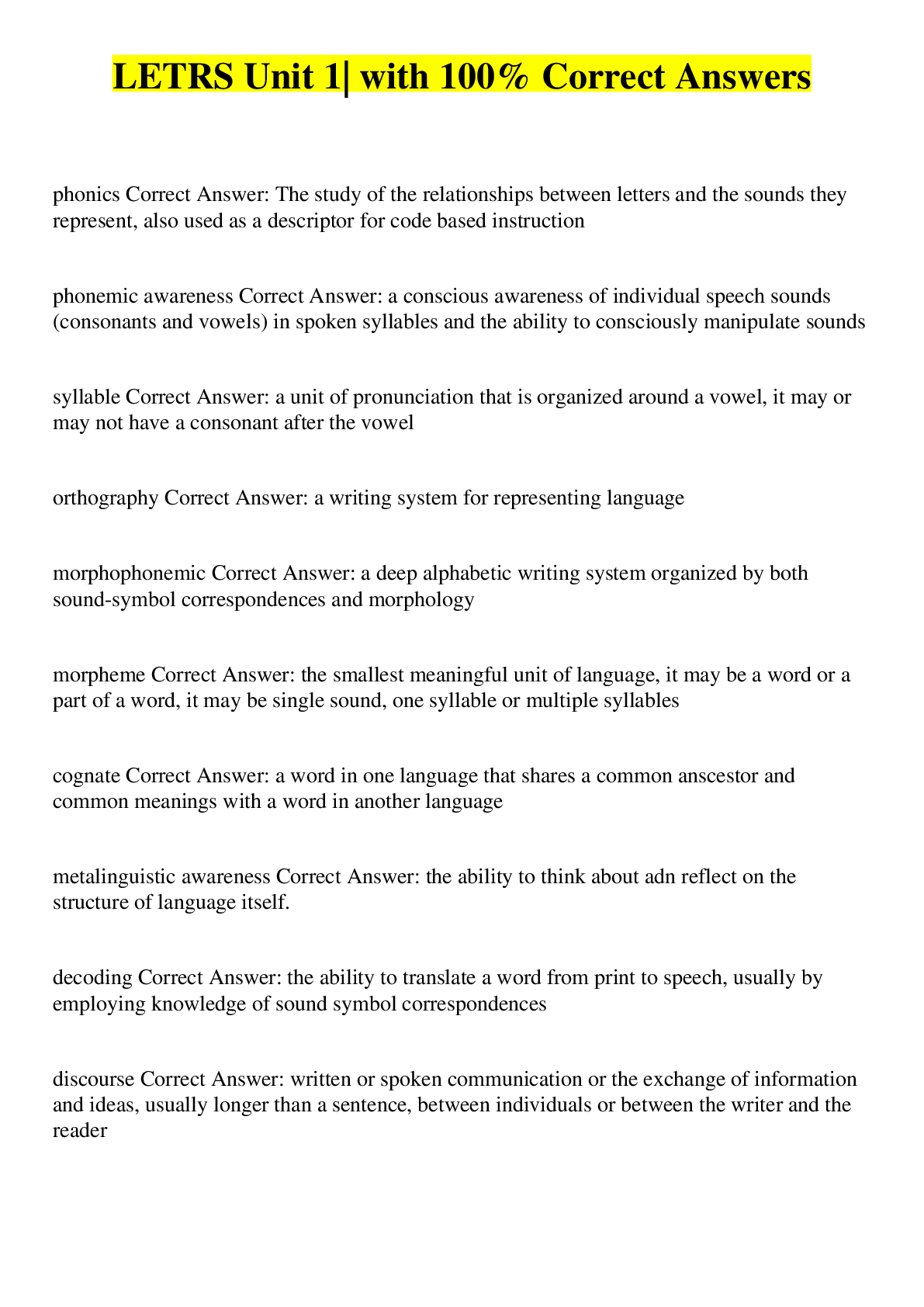
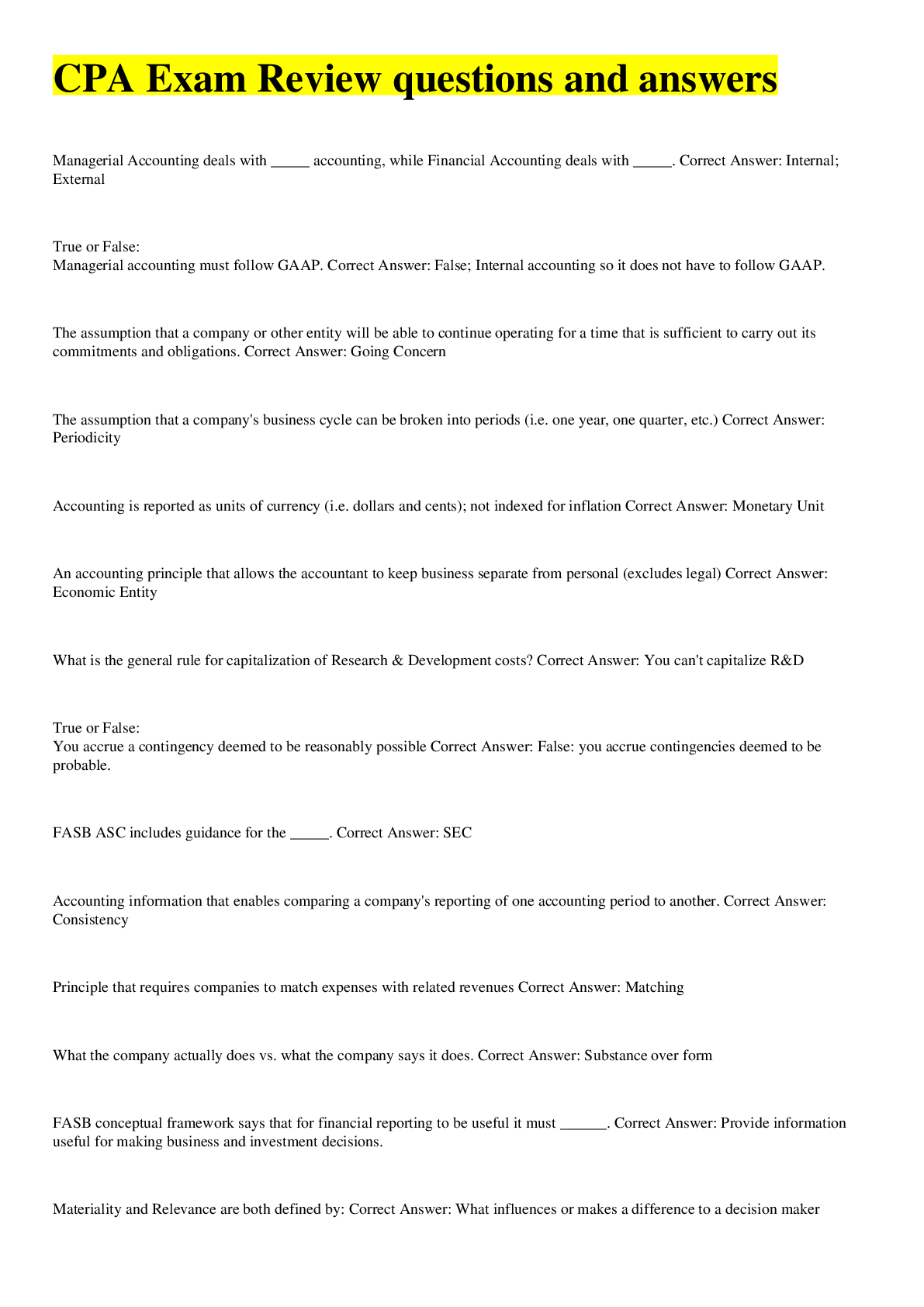
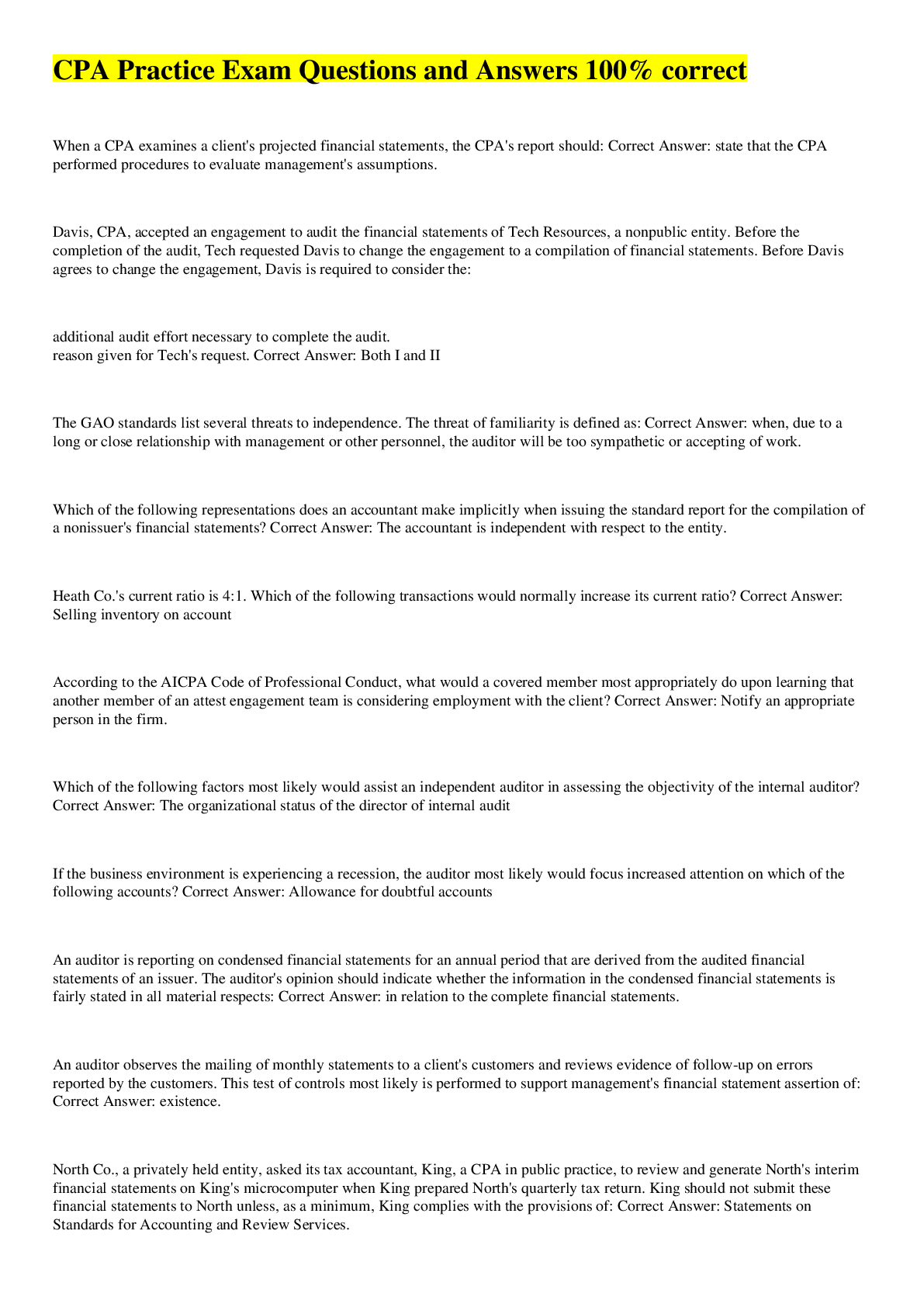
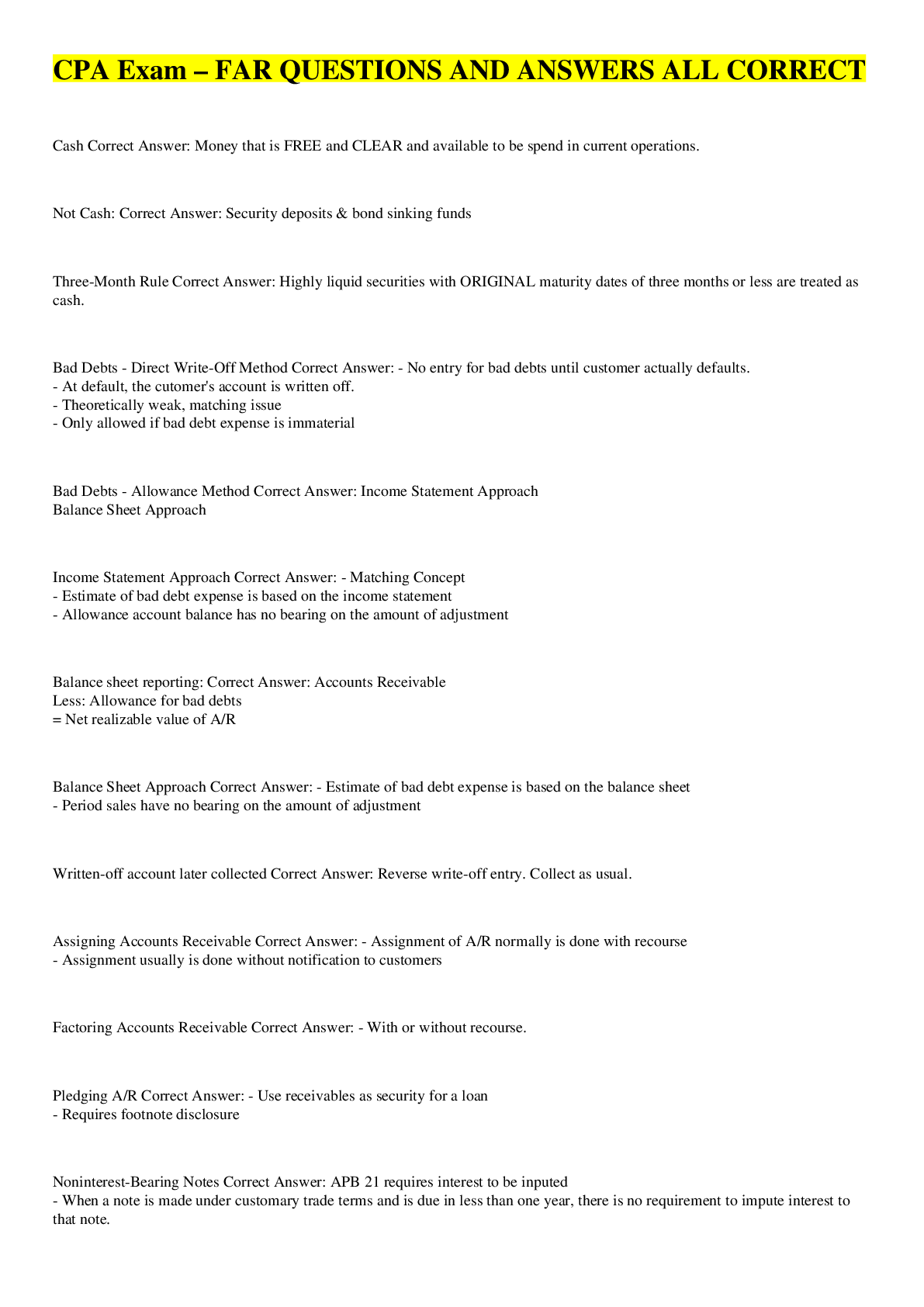
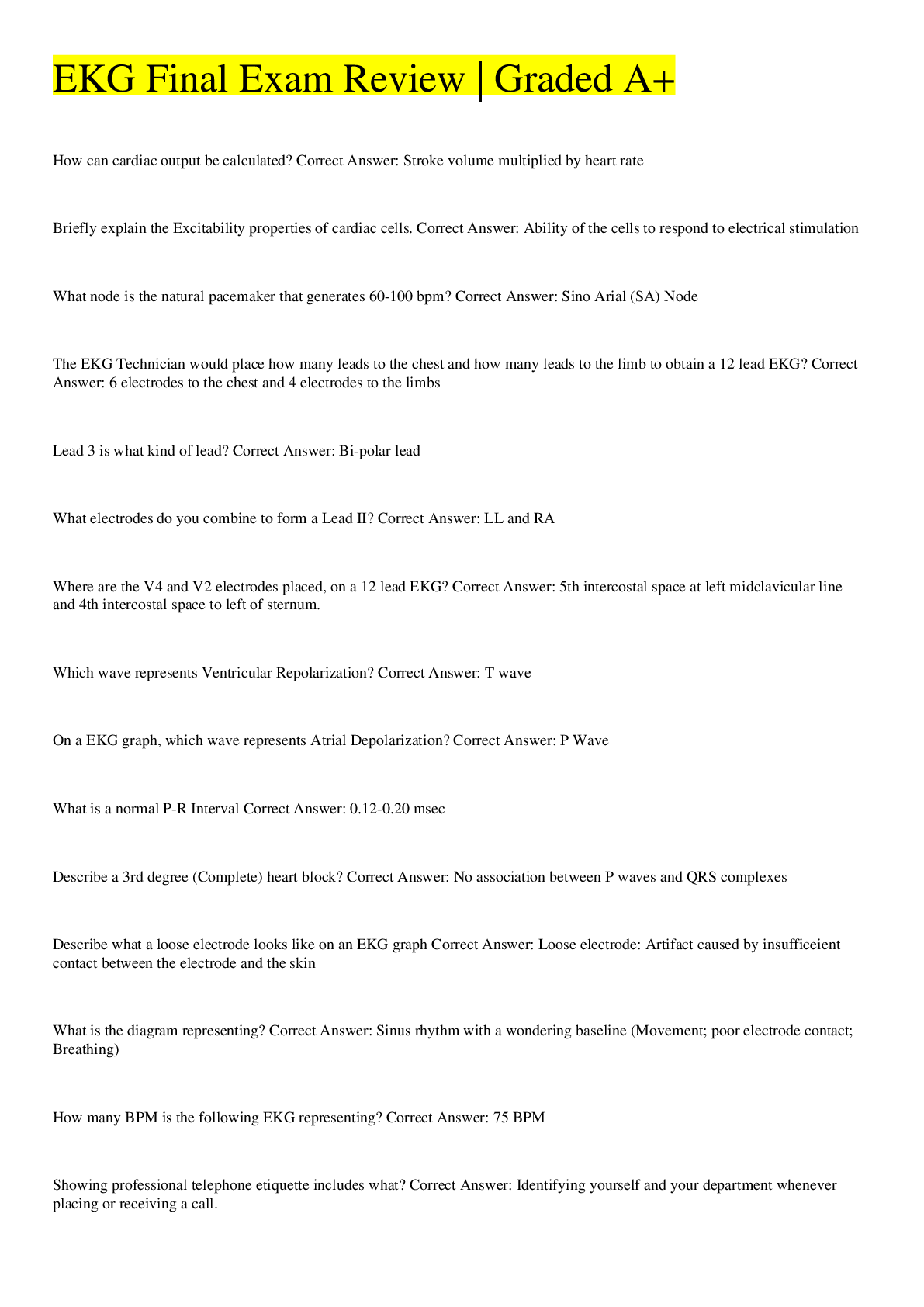
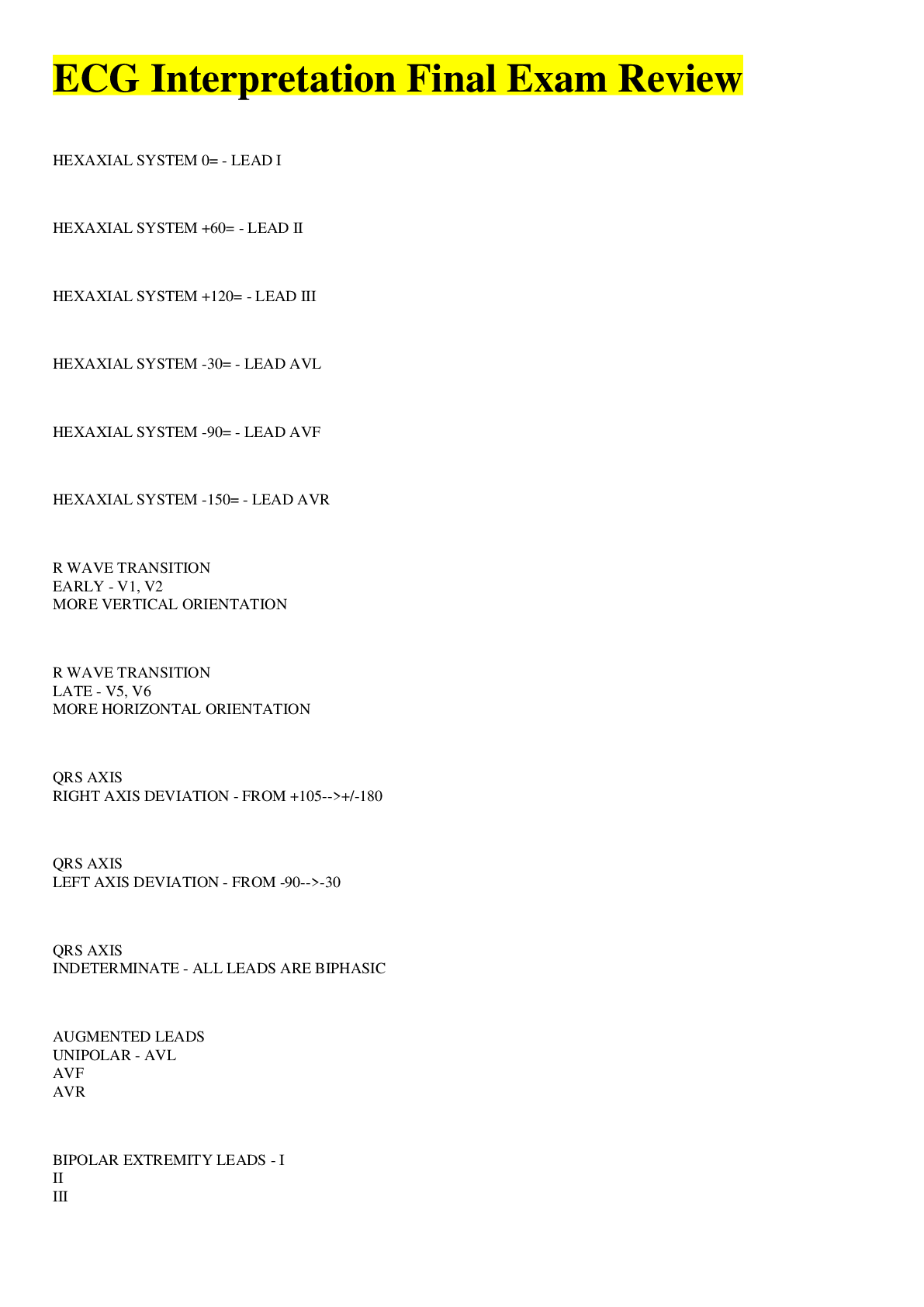
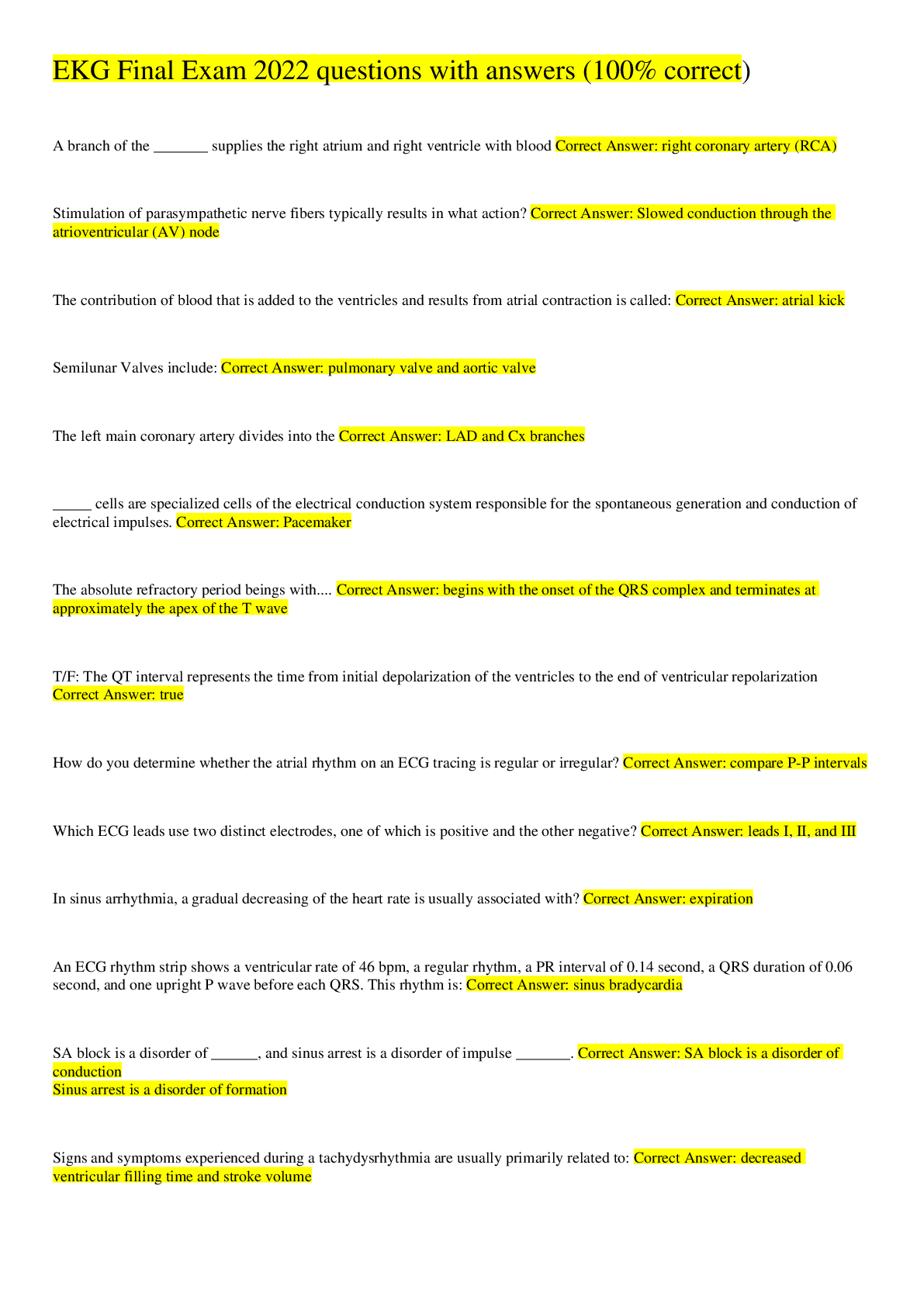
.png)
